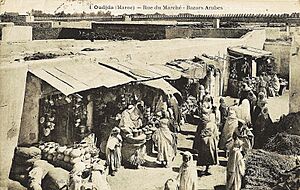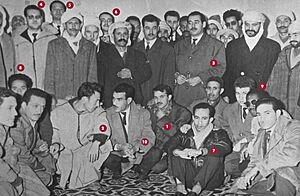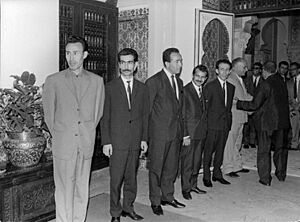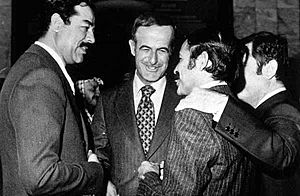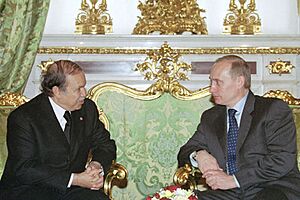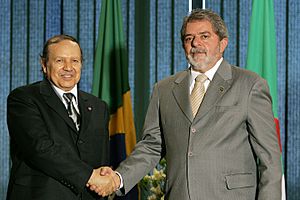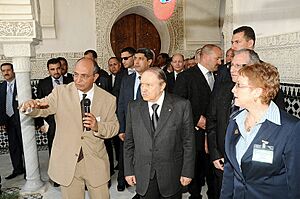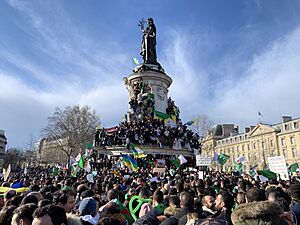Abdelaziz Bouteflika facts for kids
Quick facts for kids
Abdelaziz Bouteflika
|
|
|---|---|
|
عبد العزيز بوتفليقة
|
|
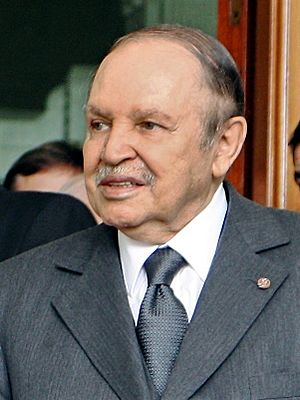
Bouteflika in 2012
|
|
| President of Algeria | |
| In office 27 April 1999 – 2 April 2019 |
|
| Prime Minister |
See list
Smail Hamdani
Ahmed Benbitour Ali Benflis Ahmed Ouyahia Abdelaziz Belkhadem Ahmed Ouyahia Abdelmalek Sellal Youcef Yousfi (acting) Abdelmalek Sellal Abdelmadjid Tebboune Ahmed Ouyahia Noureddine Bedoui |
| Preceded by | Liamine Zéroual |
| Succeeded by |
|
| 5th Chairperson of National Liberation Front | |
| In office 28 January 2005 – 17 September 2021 |
|
| Preceded by | Chadli Bendjedid |
| Minister of Defence | |
| In office 5 May 2003 – 2 April 2019 |
|
| Deputy | Ahmed Gaid Salah |
| Preceded by | Liamine Zéroual |
| Succeeded by | Abdelmadjid Tebboune |
| President of the United Nations General Assembly | |
| In office 17 September 1974 – 15 September 1975 |
|
| Preceded by | Leopoldo Benites |
| Succeeded by | Gaston Thorn |
| Minister of Foreign Affairs | |
| In office 1963–1979 |
|
| Preceded by | Mohamed Khemisti |
| Succeeded by | Mohammed Seddik Benyahia |
| Personal details | |
| Born | 2 March 1937 Oujda, French Morocco |
| Died | 17 September 2021 (aged 84) Zéralda, Algeria |
| Resting place | El Alia Cemetery, Algiers |
| Nationality | Algerian |
| Political party | National Liberation Front |
| Spouse |
Amal Triki
(m. 1990, divorced) |
| Relatives | Saïd Bouteflika (brother) |
| Military service | |
| Allegiance | |
| Branch/service | National Liberation Army |
| Years of service | 1956–1962 |
| Battles/wars | Algerian War |
Abdelaziz Bouteflika (born March 2, 1937 – died September 17, 2021) was an Algerian politician. He served as the President of Algeria from 1999 until he resigned in 2019.
Before becoming president, Bouteflika was part of the National Liberation Front during the Algerian War. After Algeria became independent from France, he became the Minister of Foreign Affairs from 1963 to 1979. He also served as the President of the United Nations General Assembly from 1974 to 1975.
In 1999, Bouteflika was elected president of Algeria. He won re-elections in 2004, 2009, and 2014. As president, he helped end the Algerian Civil War in 2002. He also ended a state of emergency in 2011 during a time of change in the region.
After a stroke in 2013, Bouteflika made fewer public appearances. His last public appearance was in 2017. He resigned on April 2, 2019, after many protests. He was Algeria's longest-serving head of state, in power for almost 20 years. He passed away in 2021 at the age of 84.
Contents
Early Life & Joining the Army
Abdelaziz Bouteflika was born on March 2, 1937, in Oujda, which was then part of French Morocco. His parents were Mansouria Ghezlaoui and Ahmed Bouteflika from Tlemcen, Algeria. He had several brothers and sisters. His younger brother, Saïd Bouteflika, later became his special advisor.
Abdelaziz grew up in Oujda, where his father had moved. He was very knowledgeable about the Qur'an. He went to three schools in Oujda and was known for doing well in his studies.
In 1956, at age 19, Bouteflika joined the National Liberation Army. This was the military part of the National Liberation Front. He received his military training in Morocco.
He reported on conditions near the Moroccan border and in western Algeria. Later, he became a close helper of Houari Boumédiène. He was a key member of the "Oujda Group." In 1960, he led the Malian Front in southern Algeria. He became known by his war name, Abdelkader al-Mali.
Political Career & Roles
After Algeria gained independence in 1962, Bouteflika became a representative for Tlemcen. He was also appointed Minister for Youth and Sport. The next year, he became the Minister for Foreign Affairs.
He played a big part in the military takeover led by Houari Boumediene in 1965. Bouteflika continued as Minister for Foreign Affairs until President Boumédienne passed away in 1978.
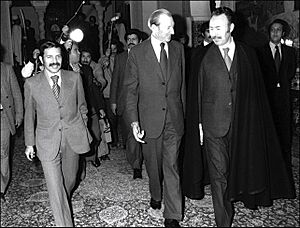
He also served as president of the United Nations General Assembly in 1974. He was the youngest person to hold this position. At that time, Algeria was a leader in the Non-Aligned Nations Movement. He had important discussions with Henry Kissinger, which were the first talks between the United States and Algeria after they restarted diplomatic relations.
In 1983, Bouteflika faced legal issues related to his time as a diplomat. He was later granted a pardon by President Chadli Bendjedid.
Return to Politics
After Boumédienne's death in 1978, Bouteflika was considered a possible successor. However, the military chose Chadli Bendjedid as president. Bouteflika's influence decreased as Bendjedid changed policies.
After living abroad for six years, Bouteflika returned to the political scene in 1989. This was a time of difficulty and change for Algeria. In 1992, the army took control and stopped elections. This led to a civil war that lasted through the 1990s. Bouteflika stayed out of the public eye during this period. In 1994, he was offered the presidency but reportedly refused.
First Term as President (1999–2004)
In 1999, President Liamine Zéroual stepped down, and early elections were called. Bouteflika ran for president as an independent candidate, with support from the military. Other candidates withdrew from the election, raising concerns.
After winning, Bouteflika held a public vote on his plans to bring peace to Algeria. These plans included offering pardons to some armed groups. He won this vote with 81% of the support, though some people questioned the results.
Foreign Relations
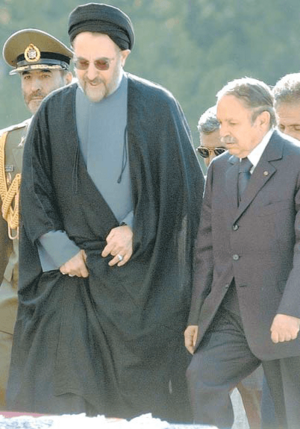
Bouteflika led the Organisation of African Unity in 2000. He helped achieve the Algiers Peace Treaty between Eritrea and Ethiopia. He also supported peace efforts in the African Great Lakes region.
Algeria signed a friendship treaty with Spain in 2002. President Jacques Chirac of France visited Algiers in 2003. Algeria became very active in African relations and worked to improve ties with Western countries. However, relations with the Kingdom of Morocco remained strained due to disagreements over the Western Sahara.
Second Term as President (2004–2009)
On April 8, 2004, Bouteflika was re-elected with 85% of the votes. Western observers generally considered this election fair. However, his rival, Ali Benflis, disagreed. Some newspapers claimed the election was not fair.
Bouteflika's victory showed his growing control over the government. He replaced his chief of staff with Ahmed Gaid Salah, a close friend. In 2004, only 17% of people in Kabylia voted, but this was an increase from previous elections. Across the country, 59% of registered voters participated.
Peace & Development Plans
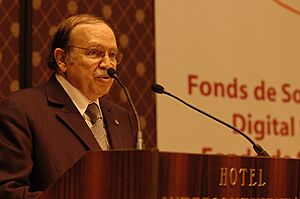
During his second term, Bouteflika held a public vote on his "Charter for Peace and National Reconciliation." This plan aimed to help Algeria recover its image and ensure stability.
He also launched a large economic plan called the Complementary Plan for Economic Growth Support (PCSC). This plan aimed to build one million homes and create two million jobs. It also included major infrastructure projects like a new highway and the Algiers subway. The PCSC involved spending $60 billion over five years. Bouteflika also worked to reduce Algeria's foreign debt.
Foreign Relations Continued
During his second term, Bouteflika strongly criticized a French law. This law stated that French history books should teach that French colonization had positive effects. This caused a diplomatic problem and delayed a friendship treaty between the two countries.
Algeria strengthened its ties with Russia. Russia agreed to forgive debts if Algeria bought weapons and allowed Russian gas companies to work in Algeria. In 2004, Bouteflika hosted the Arab League Summit. He became President of the Arab League for one year. He called for reforms in the League, but they did not get enough support.
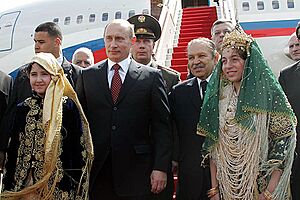
At the Arab leaders' meeting in March 2005, Bouteflika spoke strongly about the situation in Israel. He said that Arab nations should support the Palestinian people. He insisted that Arab nations would make changes at their own pace, despite criticism from the West.
In 2009, Bouteflika met with the President of Vietnam, Nguyễn Minh Triết. They agreed that their countries had great potential for stronger political and trade relations. Algeria also played a role in mediating conflicts in northern Mali.
Changes to the Constitution
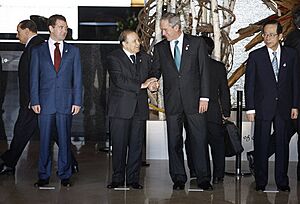
In 2006, Bouteflika appointed Abdelaziz Belkhadem as the new Prime Minister. Belkhadem announced plans to change the Algerian Constitution. These changes would allow the president to run for office more than twice and increase his powers. This was seen as a way for Bouteflika to run for a third term.
In 2008, the Council of Ministers announced that the presidential term limit would be removed. The People's National Assembly approved this change on November 12, 2008. Only one party, the Rally for Culture and Democracy, voted against it.
Third Term as President (2009–2014)
After the constitutional change, Bouteflika announced he would run for a third term. On April 10, 2009, it was announced that he won the election with 90.24% of the vote. Many opposition parties did not participate in the election.
Protests in Algeria
In 2010, journalists protested for press freedom. In February 2011, the government lifted a state of emergency that had been in place since 1992. However, protests were still banned. In April 2011, over 2,000 protesters gathered in Algiers, despite the ban. They clashed with police. Protesters said they were inspired by the Egyptian Revolution.
Fourth Term as President (2014–2019)
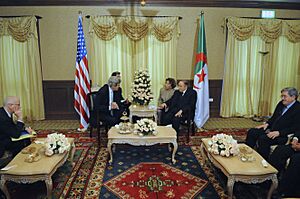
After another change to the constitution, Bouteflika ran for a fourth term. He won the election on April 18, 2014, with 81% of the vote. Many opposition parties boycotted the election again.
Bouteflika sent congratulations to Bashar al-Assad after his re-election in Syria. Bouteflika was admitted to a hospital in France in November 2014 and again in November 2016 for medical checks.
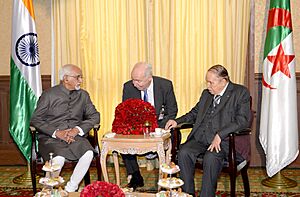
In February 2017, German Chancellor Angela Merkel canceled a trip to Algeria. This was reportedly because Bouteflika had severe bronchitis.
In June 2017, Bouteflika made a rare appearance on Algerian state television. He led a cabinet meeting with his new government. He ordered the government to reduce imports and control spending. He also called for banking reforms and more investment in renewable energy. Bouteflika used a wheelchair and had not given a public speech since 2014 due to aphasia after his stroke. He made his final public appearance that year.
During his last term, Bouteflika was rarely seen in public. It was said that he could barely speak and communicated through letters.
Protests & Resignation
On February 10, 2019, Bouteflika announced he would seek a fifth term. This caused widespread unhappiness. Young protesters demanded his picture be removed from city halls. On February 22, large protests took place in Algiers, where street protests were usually illegal. Protesters pulled down a giant poster of Bouteflika.
On March 11, 2019, after continued protests, Bouteflika announced he would not seek a new term. However, this was not enough to end the protests. On March 31, 2019, Bouteflika and Prime Minister Noureddine Bedoui formed a new cabinet. The next day, Bouteflika announced he would resign by April 28, 2019. He resigned a day earlier, on April 2, 2019, following demands from the army chief of staff.
After his resignation, Bouteflika stayed out of public view due to his declining health. He spent his final years in a medical residence in Zéralda, a suburb of Algiers.
Personal Life & Passing
In November 2005, Bouteflika was hospitalized in France. He was discharged three weeks later. The long period of silence led to rumors about his health. He was hospitalized again in April 2006.
In 2013, Bouteflika had a serious stroke. A journalist, Hichem Aboud, faced legal action for writing about the president's health.
On September 17, 2021, Bouteflika passed away at his home in Zéralda at age 84. His death was announced on state television by President Abdelmadjid Tebboune. He had been in poor health since his stroke in 2013. President Tebboune declared three days of national mourning. Bouteflika was buried at the El Alia Cemetery on September 19 in a quiet ceremony.
Criticism
Bouteflika's time in power faced claims of unfair elections from 1999 to 2019. He had also faced legal issues in 1983. Reports suggest he held a bank account with a large balance during much of his presidency.
Images for kids
See Also
 In Spanish: Abdelaziz Buteflika para niños
In Spanish: Abdelaziz Buteflika para niños
 | Madam C. J. Walker |
 | Janet Emerson Bashen |
 | Annie Turnbo Malone |
 | Maggie L. Walker |


